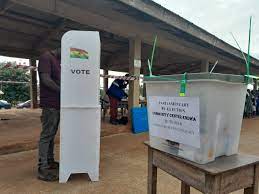Radio and Television (TV) Presenters are the voices and faces you see and hear on these same mediums. There are some security tips for radio and TV presenters before, during, and after elections 2024-2025.
Focusing on personal safety, protecting information, and maintaining a professional presence:
BEFORE ELECTION
Security Assessment: Work with station security to evaluate potential risks and develop a safety plan. This includes assessing potential threats to the station, presenters, equipment and more especially the life of the various people who are working at the Station.
- Personal Safety: Review personal security measures, like home security, travel plans, and social media privacy. Be mindful of sharing personal information. (Pictures or words post on your social media handles that will announce your personal stand on where you belong. (Even though you have a right)
- Information Management: Practice caution when discussing sensitive information or sharing details about your location. Sometimes, you may not have any single clue or idea on how it will go out .Be aware of your Security Verification Code or procedures. (Possibly check every 2 to 3 days).But with me, every day as a Suggestion.
- Emergency Contacts: Ensure your emergency contacts are updated, and you know how to reach the appropriate authorities. Create rapport with the nearest emergency station or Police Station. Especially based on Jurisdictions wise.

DURING THE ELECTION
- Stay Aware: Be vigilant about your surroundings, especially while traveling to and from work or events because you are the voice and the face of the politics in the Republic.
- Avoid Crowds: If possible, avoid large gatherings or potentially volatile locations, especially during the announcement of results. The Opposition may raise voices or volumes on untrue rumours or statements that may cause confusion leading to an attack on innocent souls.
- Secure Your Equipment: Protect your phone and other devices from theft or unauthorized access. The information you have on the device may be edited and when sent to public records may dent your reputation
- Be Mindful of Your Words: Avoid inflammatory language or promoting division.
Why Avoid Inflammatory Language?
- Escalates Conflict: Words can easily trigger strong emotions and escalate conflict, potentially leading to violence or unrest.
- Divisiveness: Inflammatory language often fuels division and distrust, making it harder to find common ground.
- Undermines Trust: It can erode trust in the media and make it harder for people to believe in the objectivity of reporting.
- Legal Consequences: In some cases, inflammatory language can even have legal consequences, like hate speech laws.
- Maintain Professionalism: Remain objective and avoid expressing personal opinions that could be perceived as biased.
AFTER THE ELECTION
- De-escalation: Encourage calm and peaceful behaviour in your broadcasts at all times .Preach Peace always because Peace is a prerequisite of life and peace is the key for successful Countries.
- Contested Results: If there are contested results, encourage viewers and listeners to follow official channels for information. Presenters kindly communicate much on this for Peace and Justice for our country.
- Continued Vigilance: Be aware of potential post-election unrest and take appropriate precautions. You’re right, continued vigilance is crucial, especially in situations like elections where tensions can run high. Here’s a breakdown of what continued vigilance means and some practical tips for radio and TV presenters:
 What Does Continued Vigilance Mean? It means remaining alert and aware of potential risks, both before, during, and after the election.
What Does Continued Vigilance Mean? It means remaining alert and aware of potential risks, both before, during, and after the election.
This includes:
- Staying Informed: Keep up-to-date on election developments, including results, potential protests, or any security concerns.
- Monitoring Social Media: Be aware of online discussions and potential threats that might emerge.
- Staying Connected: Maintain communication with trusted contacts within the station and law enforcement.
- Trusting Your Instincts: If something feels wrong or suspicious, don’t hesitate to take action.
Tips for Continued Vigilance for Radio and TV Presenters:
- Security Briefings: Participate in regular security briefings and updates from your station’s security team.
- Emergency Plans: Know the station’s emergency evacuation plans and communication protocols.
- Safe Travel: Be mindful of your travel routes and avoid potentially dangerous areas.
- Social Media Caution: Limit what you share online and be aware of potential threats or harassment.
- Security Measures: Use security measures like strong passwords, two-factor authentication, and malware protection for your devices.
- Stay Connected: Maintain communication with colleagues and trusted individuals who can provide support or alert you to any potential threats.
- Report Suspicious Activity: If you witness any suspicious activity or receive credible threats, report them to the authorities immediately.
Remember: Vigilance isn’t about living in fear, but about being prepared and informed. By staying alert, staying connected, and taking appropriate precautions, you can help ensure your safety and the safety of those around you.

- Review and Adjust: After the election, conduct a post-event security review to identify any weaknesses and improve plans for future elections.
General Tips:
- Trusted Contacts: Have a small group of trusted contacts outside of work who are aware of your security concerns.
- Social Media:
Be cautious about posting personal information on social media, especially during the election.
- Stay Informed:
Keep up-to-date on election news, results, and any potential security concerns.
- Follow Official Guidance:
Listen to and follow the advice of local authorities and your station’s security protocols.
Remember: The safety and well-being of presenters is paramount. These security tips can help stay safe and continue to provide reliable and objective coverage.
By Wisdom Dickson Ahliyah.
The Author is a freelance writer on security issues, especially those concerning personal and organisational security.
He is a seasoned Police Officer with academic background in law, cyber security, social work, peace, security and intelligence Management.



